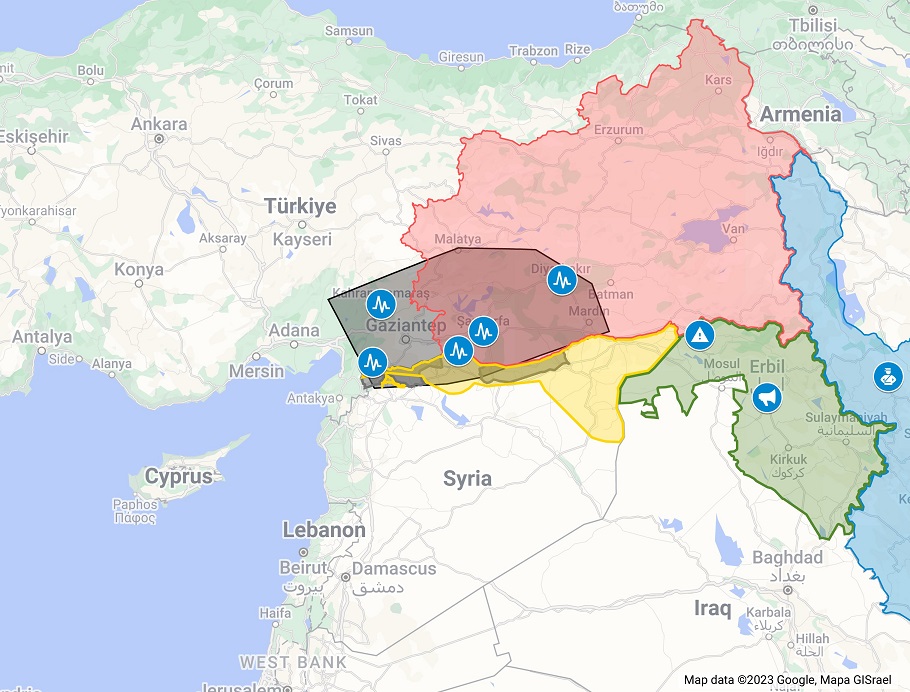A weekly brief of events occurred in the Kurdistan regions of Iran, Iraq, Syria, and Turkey.
Turkey & Syria
A 7.8 magnitude earthquake struck southern Turkey on Monday at approximately 4:17 a.m. The earthquake’s epicenter was located at Kahramanmaras, approximately 20 miles northwest of Gaziantep and 65 miles north of Aleppo. A second major quake, which measured 7.5 on the Richter scale, struck the region at 1:24 p.m. and caused further destruction. Both earthquakes originated within 35 miles of the Kurdish cities of Diyarbakir (Amed), Sanliurfa, Batman, and Mardin. The earthquakes and their accompanying aftershocks have killed at least 5,000 people, injured more than 13,000, and destroyed thousands of commercial and residential buildings. Cold weather and fuel shortages have complicated rescue efforts, and many trapped within rubble could die of exposure. The World Health Organization (WHO) warned the death toll could increase eightfold as more victims are pulled from the rubble and food shortages and the weather take their toll.
Gaziantep, which was the closest city to the earthquake’s epicenter, suffered immense destruction. Many of its residents remain without shelter as temperatures hover around freezing. The earthquake also collapsed Gaziantep Castle, which was used by the Hittite Empire as an observation point and expanded by the Roman Empire in the 2nd and 3rd centuries A.D. Meanwhile, the United Nations (UN)-affiliated International Blue Crescent (IBC) issued an appeal for tens of thousands of tents, heaters, blankets, and food for displaced residents and outlined plans to reach Diyarbakir and Malatya from its offices in Gaziantep and Urfa. Urfa, like Gaziantep, suffered high casualties and extensive damage to its buildings and infrastructure. Simultaneously, the damage caused by the earthquake forced school closings in Amed, Batman, Siirt, Mardin, and Sirnak.
On the Syrian side of the border, the earthquake injured a least four Kobane residents and inflicted significant structural damage on many of the city’s buildings. Concomitantly, Manbij and Hasakah prepared their emergency response teams in coordination with Kurdish public security forces (Asayish) and the Syrian Democratic Forces (SDF). Emergency relief units in both cities asked all residents to gather in open spaces to protect themselves from aftershocks. In addition, the Kurdish Red Crescent installed tents in Hasakah to provide medical care and house displaced people. Afrin was the hardest hit of Syria’s Kurdish cities, as multiple building collapses killed at least 250 of its residents and injured hundreds more in the city and surrounding areas. As things stand, the earthquake has killed at least 812 people and injured more than 1,449 in Assad regime-controlled areas. Rebel-controlled territories in northwestern Syria reported another 790 deaths. Finally, the North Press Agency reported the earthquake caused 63 deaths and injuries and seriously damaged hundreds of buildings in the Autonomous Administration of North and East Syria (AANES).
Iraq
- The Kurdistan Regional Government (KRG) announced a three-day holiday for schools, government institutions, and private businesses to “protect the lives of citizens” after Monday’s earthquake. Iraqi Kurdistan felt several tremors on Monday that caused some families to flee their apartments due to fears of aftershocks. The KRG also suspended oil exports to Turkey after the Ceyhan oil terminal lost power. Lastly, the KRG sent dozens of medical personnel and ambulances to aid affected people in Turkey.
- The KRG expressed “disappointment” with the Iraqi Federal Supreme Court’s decision to prevent the Iraqi government from providing funding for Kurdish employee salaries and other budgetary obligations. Iraq’s new government previously approved 400 billion dinars for the KRG, but the funds remain in limbo because the court ruled their delivery was unconstitutional.
Iran
- The Iranian supreme court Ali Khamaeni claimed “Amnesty” to allegedly thousands of people, including the anti-government protesters. However, the regime endured its campaign against activists and civilians to suppress anti-government protests further. According to the Hengaw Organization for Human Rights, the Iranian regime arrested 182 Kurds in January for various reasons, including political and civilian charges. Last week, the Iranian security forces detained twelve Kurds from Abdanan, increasing the number of civilian detainees in the city to 104. Likewise, the regime forces kidnapped several civilians in Kamyaran, Sena, Kamyaran, Piranshahr, Jwanro, Kermanshah, Qasri Sherin, and Darashar. At the same time, hundreds of civilians’ fates remain unknown after arrest. Moreover, the Islamic Revolutionary Court in Bokan sentenced a Kurdish journalist to 17 months in prison for “propaganda” against the regime. Likewise, the Tehran court branch sentenced a Kurdish man to three years for “meetings and plans” against the regime.

